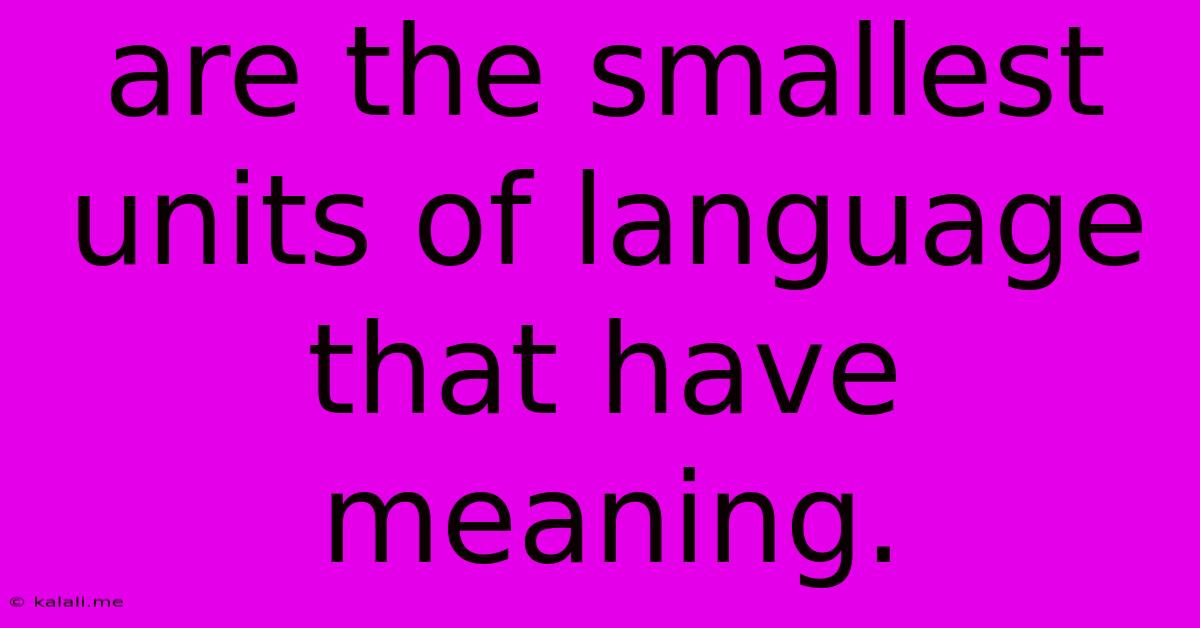Are The Smallest Units Of Language That Have Meaning.
Kalali
Jun 12, 2025 · 3 min read

Table of Contents
Are Morphemes the Smallest Units of Language That Have Meaning? Unlocking the Building Blocks of Words
What are the smallest units of language that have meaning? This seemingly simple question leads us down a fascinating path into the world of morphology, the study of word formation. While the answer might seem straightforward, it's actually more nuanced than you might initially think. This article will explore the concept of morphemes and their role as the fundamental building blocks of language, examining potential exceptions and complexities along the way.
The most commonly accepted answer is morphemes. A morpheme is the smallest unit in a language that carries meaning or has a grammatical function. Understanding morphemes is crucial to grasping how words are constructed and how language evolves. They can be free or bound.
Free Morphemes vs. Bound Morphemes: The Two Sides of the Morpheme Coin
-
Free morphemes can stand alone as words. Examples include "cat," "dog," "run," and "happy." These are complete units of meaning on their own.
-
Bound morphemes, on the other hand, cannot stand alone. They must be attached to other morphemes to have meaning. These often include prefixes ("un-", "re-") and suffixes ("-ing," "-ed," "-s"). Consider the word "unhappily." "Un-" is a bound morpheme indicating negation, "-ly" is a bound morpheme indicating an adverbial function, and "happy" is a free morpheme.
The Challenge of Defining "Meaning": Where Things Get Complicated
While the definition of a morpheme seems clear-cut, the concept of "meaning" itself is complex. This complexity sometimes challenges the simple definition of morphemes as the smallest units of meaning. Consider these points:
-
Grammatical Morphemes: Some morphemes primarily contribute to grammar rather than lexical meaning. For instance, the plural marker "-s" in "cats" doesn't add a distinct meaning in the same way "cat" does. It adds grammatical information.
-
Idioms and Compound Words: Idioms like "kick the bucket" have a meaning that is not derived from the individual meanings of their constituent morphemes. Similarly, compound words, while comprised of multiple morphemes, often take on a meaning that surpasses the sum of their parts.
-
Affixes and their subtle impact: The meaning of an affix can change depending on the morpheme it's attached to. This adds another layer of complexity to this fundamental unit of language.
Beyond Morphemes: Exploring Other Linguistic Units
It's important to note that while morphemes are generally considered the smallest meaningful units, other linguistic units might play a role, depending on the theoretical framework used. For instance, some linguistic theories might argue that phonemes (the smallest units of sound) indirectly contribute to meaning through their combination and arrangement within morphemes.
Conclusion: Morphemes as the Foundation of Language
Despite the complexities and nuances discussed, morphemes remain the most widely accepted answer to the question of the smallest meaningful units of language. They represent the fundamental building blocks from which words are constructed, ultimately shaping the expressive power of human language. While challenges exist in definitively defining "meaning," the concept of the morpheme provides a robust framework for understanding word formation and the intricacies of linguistic structure. Further research into morphology and related fields continues to deepen our understanding of this crucial aspect of human communication.
Latest Posts
Latest Posts
-
How Is Culture Different From Society
Jun 13, 2025
-
The Place Where An Organism Lives
Jun 13, 2025
-
1 2 6 24 120
Jun 13, 2025
-
Which Of The Following Is Not A Personal Computer
Jun 13, 2025
-
Webcam Is Input Or Output Device
Jun 13, 2025
Related Post
Thank you for visiting our website which covers about Are The Smallest Units Of Language That Have Meaning. . We hope the information provided has been useful to you. Feel free to contact us if you have any questions or need further assistance. See you next time and don't miss to bookmark.